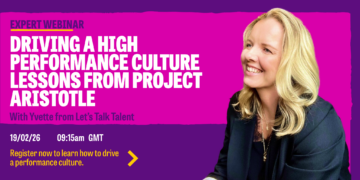Free HR Webinars & Courses For Future HR Leaders By Let's Talk Talent
Upcoming Courses
Driving A High Performance Culture Lessons From Project Aristotle
Webinar
|
February 19, 2026 9:15 am
Culture exists whether it is managed or not, and it will form its own shape without intervention. In today’s competitive landscape, the business case for high-performance cultures is solid:
Profitability: Cohesive teams can lead to a 21% increase in profits.
Productivity: High-performing teams are 20% more productive.
Retention and Wellness: Strong connectedness results in 41% less absenteeism and 59% less employee turnover.
Previous Courses
Webinar - February 5, 2026 9:15 am -
The Truths And Lies About Unlocking Your Team’s Performance & Potential
Webinar - January 22, 2026 9:15 am -
How Leaders Can Link Purpose to Performance
Webinar - January 8, 2026 9:15 am -
Performance Reviews Are Dead?
Webinar - December 4, 2025 9:15 am -
Reset, Refocus, Reimagine Your L&D Strategy for 2026
Webinar - November 20, 2025 9:15 am -
Future Skills for Future Teams
Webinar - November 6, 2025 9:15 am -
The Leadership Blind Spots That Undermine Team Performance
Webinar - October 30, 2025 9:15 am -
The Wrap-Up: 10 Years of Talent – What’s Next for You?
Webinar - October 9, 2025 9:15 am -
Lead Forward – Redefining management in the age of change
Webinar - September 4, 2025 9:15 am -
Strategic HR in 2025: Aligning People with Performance
Webinar - August 28, 2025 9:15 am -
HR Horizon 2026: AI, Agility, and the Art of Human-Centered Leadership
Webinar - July 31, 2025 9:15 am -
Assessment for Impact: Moving Beyond the Tick-Box
Webinar - July 10, 2025 9:15 am -
Coaching That Counts: The Strategic Value of Leadership Coaching
Webinar - June 26, 2025 9:15 am -
Architecting Teams That Exceed Expectations – Webinar
Webinar - June 12, 2025 9:15 am -
HR Business Partnering In Practice – Webinar
Webinar - May 29, 2025 9:15 am -
The Four Pillars Of OD, and What They Mean For You
Webinar - May 16, 2025 9:15 am -
Learning At Work Week – Crafting Mentoring Programmes To Supercharge Team Potential
Webinar - May 15, 2025 9:15 am -
Learning At Work Week – Your Mid-Year Trends Pulse-Check
Webinar - May 13, 2025 9:15 am -
Learning At Work Week – Building Career Pathways That Actually Work
Webinar - May 12, 2025 9:15 am -
Learning At Work Week – Boost Yourself With Networking Career Sprints
Webinar - April 24, 2025 9:15 am -
People First, Results Focused: Aligning Performance With Purpose
